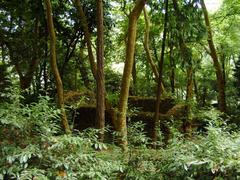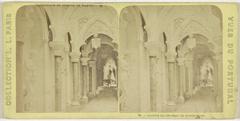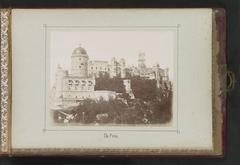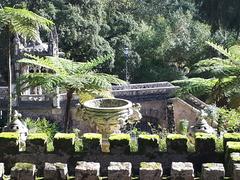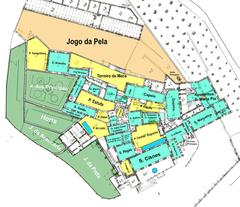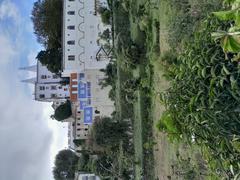Villa Sassetti Visiting Hours, Tickets, and Historical Significance in Sintra, Portugal
Date: 03/07/2025
Introduction: Villa Sassetti – Sintra’s Hidden Gem
Nestled amid the lush slopes of the Sintra hills, Villa Sassetti is an enchanting historical retreat that offers visitors a unique blend of Italianate architecture and Portuguese cultural heritage. Unlike Sintra’s more prominent palaces, Villa Sassetti provides an intimate setting where history, architecture, and nature come together. Commissioned by Victor Carlos Sassetti and designed by Italian architect Luigi Manini in the late 19th century, the villa stands out for its harmonious integration of Lombard Romanesque and Mediterranean motifs within Sintra’s verdant landscape. The estate features winding garden paths, water features, and a diverse array of flora, all crafted to evoke the Romantic era’s fascination with the picturesque and theatrical.
This detailed guide will help you plan your visit, offering up-to-date information on opening hours, ticketing, accessibility, nearby trails, practical tips, and the villa’s historical and architectural context. For the most current updates and visitor information, consult the official Parques de Sintra website and other reputable resources (Bucket List Portugal; Sintra Explorers).
Table of Contents
- Introduction to Villa Sassetti
- Historical Background and Architectural Highlights
- Visiting Hours, Ticketing, and Admission
- Gardens, Trails, and Landscape Integration
- Access, Facilities, and Visitor Tips
- Cultural Significance and Restoration
- FAQs
- Additional Resources and References
Historical Background and Architectural Highlights
Origins and Design
Villa Sassetti was constructed between 1890 and 1894, commissioned by Victor Carlos Sassetti—a prominent hotelier of Italian descent. The villa was designed by Luigi Manini, also known for his work on Quinta da Regaleira. Inspired by the rustic castles of Lombardy, Manini’s design features a striking three-story round tower with a conical roof, terracotta facades, granite details, and decorative tile panels. Moorish influences are visible in window shapes and ornamental details, reflecting the eclectic architectural landscape of Sintra.
Integration with Nature
The villa’s 1.2-hectare gardens are an essential part of its charm. Manini’s scenographic approach is evident in the garden’s winding paths, artificial watercourses, pergolas, and thoughtfully curated Mediterranean and exotic plants including camellias, rhododendrons, agapanthus, banana plants, and palms. The garden’s layout invites leisurely exploration and stunning views over Sintra’s historic landmarks.
Evolution Over Time
After Victor Sassetti’s death in 1910, Villa Sassetti changed hands several times. Notably, Calouste Gulbenkian, the Armenian oil magnate, leased the estate in the early 20th century. Later, Isabel Armanda Luísa Real expanded the property and renamed it “Quinta da Amizade.” The Municipality of Sintra acquired and restored the villa in the early 2000s, with significant restoration completed in 2015 to preserve its architectural and landscape heritage (Parques de Sintra).
Visiting Hours, Ticketing, and Admission
Opening Hours:
- High Season (spring to early autumn): 10:00 AM – 6:00 PM
- Low Season (late autumn to winter): 9:00 AM – 5:00 PM
- Closed on Mondays and select holidays (January 1st, Easter Sunday, May 1st, December 24th, 25th, and 31st).
Entry Fee:
- Entry to the villa’s gardens and grounds is free for all visitors.
- The villa’s interior is currently closed due to ongoing restoration (expected through July 2025).
Tickets:
- No ticket is required to access the gardens.
- Combined tickets for Sintra’s other monuments are available for visitors planning to explore several sites in a single day.
Current Information:
- Always confirm opening hours and restoration updates on the Parques de Sintra website.
Gardens, Trails, and Landscape Integration
The Villa Sassetti Walking Trail
A highlight for many visitors, the Villa Sassetti trail connects Sintra’s historic center to the Moorish Castle and Pena Palace. The 1.8 km trail features well-maintained paths shaded by oak and chestnut trees, with interpretive signage and scenic viewpoints along the way. Ideal for hikers and nature lovers, the trail offers a peaceful alternative to the busier main roads (Bucket List Portugal).
What to See
- Admire the villa’s Italianate exterior and circular tower.
- Explore the gardens’ diverse flora, artificial streams, and stone benches.
- Enjoy panoramic views of the National Palace of Sintra, Chalet Biester, Seteais Palace, and Quinta da Regaleira.
- The gardens also feature a distinctive circular dovecote and shaded pergolas.
Access, Facilities, and Visitor Tips
Getting There
- By Foot: A scenic uphill walk from Sintra National Palace (10 minutes) along Estrada da Pena.
- By Train/Public Transport: Sintra train station is a 20-minute walk away; tourist buses 434 and 435 stop nearby.
- By Car: Limited parking is available; it’s best to use public lots at the town entrance and walk to the villa.
Facilities
- Gardens: Open for exploration, with benches and shaded areas.
- Cafeteria and Restrooms: Available on-site.
- Accessibility: Garden paths are well maintained but can be steep or uneven in places. Some areas may be challenging for visitors with limited mobility.
Visitor Tips
- Wear sturdy footwear and dress in layers for Sintra’s unpredictable weather.
- Visit on weekdays or early mornings for a quieter experience.
- Bring water and snacks, especially if you plan to hike the trails.
- Respect the gardens and heritage by staying on marked paths and not disturbing plants or wildlife.
Cultural Significance and Restoration
Villa Sassetti is a testament to Sintra’s transformation in the late 19th century into a cosmopolitan summer retreat. Its blend of Italianate, Moorish, and Portuguese elements reflects the period’s artistic experimentation. The villa’s integration into the network of Sintra’s walking trails enhances its role as a gateway between the town’s historic center and iconic hilltop monuments (Sintra Explorers).
Ongoing preservation focuses on maintaining the villa’s original materials, historic garden features, and visitor infrastructure. Restoration efforts align with sustainable heritage management principles, ensuring the site’s continued relevance for future generations (Parques de Sintra).
Frequently Asked Questions (FAQ)
What are Villa Sassetti’s opening hours?
Open Tuesday to Sunday, 10:00 AM – 6:00 PM in high season, 9:00 AM – 5:00 PM in low season; closed Mondays and select holidays.
Is there an admission fee?
No, entry to the gardens is free. The villa’s interior is closed due to restoration.
How do I get to Villa Sassetti from Sintra’s historic center?
It’s a 10-minute scenic walk from the National Palace or a 20-minute walk from Sintra train station. Bus and taxi options are also available.
Are guided tours available?
Regular guided tours are not provided on-site but may be booked through local operators or tourism offices.
Is Villa Sassetti accessible for visitors with mobility challenges?
Some garden paths are uneven and steep; benches are available for rest, but full accessibility is limited.
Can I take photographs?
Yes, personal photography (without flash or tripod) is permitted in the gardens.
Additional Resources and References
- Villa Sassetti on Parques de Sintra
- Villa Sassetti Trail Guide – Bucket List Portugal
- Sintra Attractions Guide – Sintra Explorers
- Sintra by Foot – Parques de Sintra
Conclusion
Villa Sassetti is a hidden jewel in Sintra, offering a peaceful escape with its harmonious blend of Italian and Portuguese architectural elements and beautifully designed gardens. Its strategic location makes it an ideal starting point or tranquil stop along Sintra’s celebrated heritage trails. With free admission, accessible walking paths, and a rich cultural history, Villa Sassetti is a must-visit for those seeking a quieter, authentic Sintra experience.
For the latest updates on visiting hours, restoration progress, and special events, always refer to the official Parques de Sintra website.


